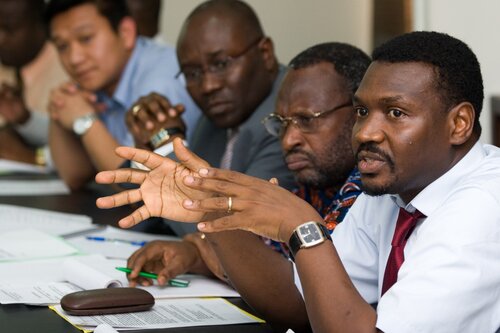UHC2030 hosted its annual UHC Day parliamentarian town hall to...
10 July 2020
UHC2030 Co-Chairs, the Inter-Parliamentary Union President and the UHC movement Political Advisory Panel promote national investment and action for UHC to all Presidents of Parliaments.

Turning commitments for universal health coverage (UHC) into action is a vital step along the path for health for all.
In September 2019, at the United Nations High-Level Meeting (UN HLM) “Universal Health Coverage: Moving Together to Build a Healthier World”, world leaders endorsed the most ambitious and comprehensive political declaration on health in history.
Now the big question is how to translate this commitment into national and local solutions to achieve UHC? Parliamentarians, ministers and local government officials play a major role to promote, finance and implement UHC, and their commitments and actions are critical for global commitments to be translated into local solutions.
UHC2030 recently established a UHC movement Political Advisory Panel to help ensure that commitment translates into action in countries and one panel member is Ms. Gabriela Cuevas Barron President, President of the Inter-Parliamentary Union (IPU).
As a first step, the IPU President, UHC movement Political Advisory Panel and UHC2030 Co-Chairs have sent a powerful letter to all Presidents of Parliaments, at a time when many parliaments are moving into the final stage of the next national budgetary cycle. The letter calls on all Presidents of Parliaments to prioritise investment in strong and resilient health systems for UHC, and greater preparedness for health emergencies.
In 2019, following the UN HLM, the IPU adopted an important resolution for all countries to implement UHC in countries with parliaments reporting to them on progress. The commitment and action of Parliaments to take forward this agenda is now crucial for all countries. The letter from the UHC movement Political Advisory Panel contains some important messages including:
- Priorities for parliaments should be to fund ‘common goods for health’ such as comprehensive surveillance, laboratories, information systems, information, education and communication starting at the community – to strengthen both emergency preparedness and primary health care.
- The current COVID-19 pandemic provides a compelling reason to prioritize investments in health now, for both health and economic reasons.
- Parliaments should encourage governments to embark on a ‘whole of society’ approach with strong accountability, gender equity and the empowerment of women in shaping health emergency preparedness and response, which involve communities and all relevant stakeholders and organizations, including civil society and the private sector.
- Investments in public health, common goods for health equitable and resilient health systems, will save lives and protect the economy, now and in the future.
Photo: WHO / Olivier Asselin
More UHC2030 News
A global health financing emergency threatens progress toward...
UHC2030 at HSR2024: Advancing equity and inclusion in health systems through civil society knowledge
UHC2030, in collaboration with the SUPPORT-SYSTEMS research...
